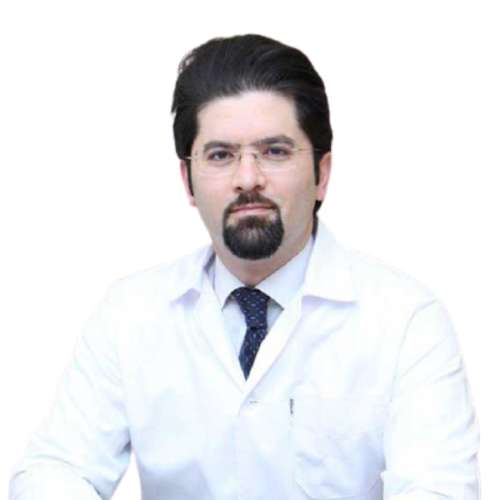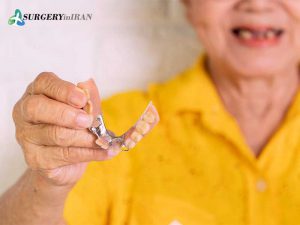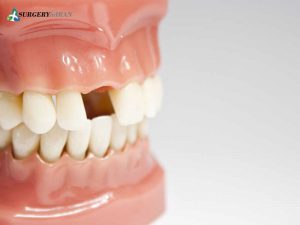Familiarity with dentures and their types
Problems with the loss of natural teeth
A complete dental hand or complete dental prosthesis
A prosthesis is generally an artificial body that replaces a part of the body that has been lost for any reason and tries to perform the functions of the lost organ as much as possible. There are different types of prostheses, each of which is used for a body part, such as prostheses for hands, feet, eyes, teeth, etc. To make a prosthesis, a mixture of science and art is needed.
In dentistry, there is a special field for making prostheses, and people who have the science and art of making prostheses are called prosthetics.
Types of dentures
Dental prostheses have different divisions in different ways. Most people know dentures as dentures, and when a person has lost all of their teeth, a complete denture is used, which is popularly known as a complete denture.
Teeth are one of the most important organs of every human body and undergo the most changes during human life and are destroyed due to various causes such as caries, which cause many problems such as difficulty in chewing food and problems for the digestive system. Another factor that causes tooth loss is diseases related to the tissues that support the teeth, which in some people is the most important reason for the loss of natural teeth.
Some people may not have tooth decay for the rest of their lives, and only the breakdown and alteration of the tooth-supporting tissue caused by aging can lead to the loss of their teeth. This period is called the edentulous period and few people do not suffer from this complication with age. However, some people accelerate the onset of their edentulous period by not observing their oral hygiene and not visiting the dentist regularly and promptly.
In recent years, many efforts have been made to preserve the tissues and tissues that support teeth, and to a large extent have been able to delay this. Today, with the education and culture of oral health care, to a large extent, the period of rootlessness of human beings has been postponed to the last years of their lives. However, many people believe that the loss of natural teeth is not very important and can be easily compensated with a complete denture or a complete prosthesis. But what is clear is that so far no prosthesis has been able to completely and satisfactorily compensate for the defects of the human body. The same is true of dentures. The dental prosthesis is indeed a very good solution to solve the problem of toothless people, but in any case, nothing artificial can be a complete replacement for a natural part of the human body. Therefore, all human beings should first and foremost pay special attention to the preservation of their natural teeth.
Problems with the loss of natural teeth
As we have said, teeth are one of the organs of the body that are subject to the most changes during human life, and in many cases, caries and their disappearance are inevitable, so scientists and doctors are always trying to find a suitable solution and alternative for Find this problem and have achieved a lot of success in this field to date. Loss of natural teeth causes many problems for humans, which are mentioned below:
- Causes problems with chewing food.
- Causes digestive problems for the person.
- The tissues that support the teeth are decaying.
- Causes problems in speaking.
- And affects the beauty of the face.
In the meantime, preserving the tooth-supporting tissue is very important, but unfortunately, less attention is paid to it. In many cases, when the treatment is performed by unskilled people, the relative beauty is restored to the person, but little attention is paid to preserving the tissue inside the oral cavity, which may cause irreparable damage to the person and possibly in the future. Not so long ago, when a complete denture was needed, they could not use the ideal denture due to the loss of tissue. Therefore, making dentures requires skills and knowledge in various fields, including anatomy, physiology, biology, histology, and oral microbiology.
What is a denture?
Dental prostheses are dentures that come in many forms and cover a wide range from a simple denture to a complete set of dentures. There are several reasons for using dentures, including beauty and treatment.
In general, dental prostheses consist of two main parts, acrylic, which is the pink part, and gums of the prosthesis, and metal alloy, which is made of cream and cobalt. Due to the unpleasant appearance of metal clamps on dentures, today another type of denture is used, the metal part of which is tooth-colored.
Types of dental prostheses
There are generally two types of dentures that are as follows:
- Fixed dentures
- Removable dental prosthesis
Fixed dental prosthesis
There are three types of fixed dentures or veneers:
- Single-unit dental veneer
People usually refer to fixed dentures as veneers. When a person’s teeth need a veneer that has lost its structure and strength due to small and large cracks or excessive decay and needs protection, and in fact, the veneer protects it from the risk of further decay and damage in Keeps safe. Sometimes dental veneers are used to beautify the appearance of teeth. Also, in some cases, dental veneers are used to improve the function of the teeth to better chew food.
- b Ridge or dental bridge
Bridges are another fixed denture and are used in cases where a person has lost one or more teeth but has one tooth in the front and one tooth in the back. By shaving these two teeth, a bridge or bridge is built between these two teeth, and the gaps of the missing teeth are filled by this bridge and the function of the teeth in chewing food is improved.
- Implants
Another fixed denture is an implant that has gained a lot of popularity today.
Removable dental prosthesis
In some cases where it is not possible to use fixed dentures, removable dentures can be used. These prostheses can be easily inserted into the mouth and removed. In the following text, we will explain it.
All-acrylic partial prosthesis: This prosthesis is used as a temporary treatment in many cases
Cobalt cream prosthesis: This prosthesis is used to treat edentulousness with free anthers. This prosthesis is used in cases where a person does not have teeth at the end of his jaw to use for the base of the prosthesis, as well as people who are not interested in using a fixed prosthesis.
A complete dental hand or complete dental prosthesis
Removable dentures are used in people who have lost all their teeth, but with the advent of implants, most people today use implants. However, due to the lower cost of dentures, this method is still of interest to many people.
Soft gum dentures are used to remove gingivitis in a thin layer approximately 1-2 mm thick under the hard gums for a short time to prepare the patient’s mouth for a hard gum prosthesis.
But the question is why soft tooth gums are not always used? Because dentures with soft gums destroy the tissue and tissue of the patient’s gums and also hygiene is much more difficult for such prostheses and provides a suitable environment for the growth of fungi and bacteria.
At the beginning of using a denture, the tissue inside the mouth and gums may become inflamed and the foreign body may not accept it easily, and you may be a little annoyed. Talk to your dentist.
To increase the life and durability of dentures, it is very important to observe hygiene, which we will refer to in the following methods of denture care.
Removable prosthesis care methods
Brush your dentures twice a day.
- In the first days of using a removable prosthesis and do not take it out of your mouth during sleep at night.
- Be careful not to drop the prosthesis when cleaning it.
Clean the inside of your mouth and gums with a soft toothbrush every day.
Once a week, place your removable denture in the disinfectant solution for 8 hours.
When you take your denture out of your mouth, put it in saltwater.
- Clean your dentures immediately after eating foods containing pigment.
If the denture changes color, soak it in a solution of water and bleach for 8 hours.



















